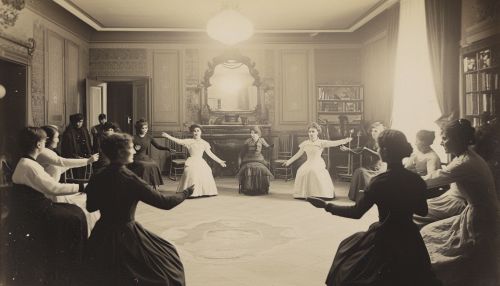Couéism
Introduction
Couéism is a self-improvement method developed by French pharmacist Émile Coué in the early 20th century. It revolves around the concept of autosuggestion, a type of self-induced suggestion where individuals guide their own thoughts, feelings, or behavior. The method is based on optimistic self-projection and the belief that a positive mental attitude can lead to increased self-improvement and self-healing.


Émile Coué and the Origins of Couéism
Émile Coué (1857–1926) was a French pharmacist who developed the method of Couéism. His interest in the power of suggestion began when he worked as an apothecary. He noticed that when he praised the efficacy of a medicine, it appeared to enhance its effect on patients. This observation led him to delve deeper into the study of hypnosis and the power of the mind, eventually leading to the development of his method.
Principles of Couéism
The principles of Couéism are rooted in the theory of autosuggestion. Coué believed that our minds have the power to steer our bodies towards health and wellbeing. He proposed that by consciously using autosuggestion, individuals could influence their subconscious minds and bring about positive physical and mental changes.
Couéism is built on four primary principles:
1. The body is governed by the mind: Coué believed that the mind has the power to control the body's functions and responses. 2. The subconscious mind is more powerful than the conscious mind: According to Coué, the subconscious mind is always listening and responding to the thoughts and ideas that we feed it. 3. Imagination is more powerful than will: Coué argued that if the will and the imagination are in conflict, the imagination always wins. 4. Autosuggestion is a tool that can be used to influence the subconscious mind: Coué taught his patients to use positive affirmations and visualizations to influence their subconscious minds.
The most famous of Coué's autosuggestions is the phrase "Every day, in every way, I'm getting better and better" (French: "Tous les jours à tous points de vue je vais de mieux en mieux"). He advised his patients to repeat this phrase 20 times in the morning and 20 times in the evening, believing that this would lead to an improvement in their physical and mental health.
Techniques of Couéism
The primary technique of Couéism is the practice of autosuggestion. This involves the repetition of positive affirmations, either silently or aloud. Coué advised that these affirmations should be made with emotion and conviction, as the subconscious mind is more receptive to ideas that are charged with feeling.
Another technique used in Couéism is visualization. Coué encouraged his patients to visualize the outcomes they desired, as he believed that the subconscious mind responds more readily to images than to words.
Influence and Legacy
Coué's ideas have had a significant impact on the field of self-help and personal development. His theories on the power of autosuggestion have influenced numerous self-help authors and motivational speakers. Despite the simplicity of his method, Coué’s influence on the field of psychotherapy and self-improvement is undeniable.
Criticisms and Controversies
While Couéism has been praised for its simplicity and its focus on the power of positive thinking, it has also faced criticism. Some critics argue that it oversimplifies the complexities of human psychology. Others contend that it places too much responsibility on the individual for their own wellbeing, potentially leading to self-blame when improvements are not seen.
Conclusion
Couéism, with its focus on the power of positive autosuggestion, offers a simple yet powerful tool for self-improvement. Despite criticisms, its influence on the fields of self-help and personal development is undeniable. As we continue to explore the power of the mind in shaping our reality, the principles of Couéism remain as relevant today as they were in the early 20th century.
